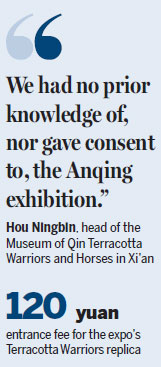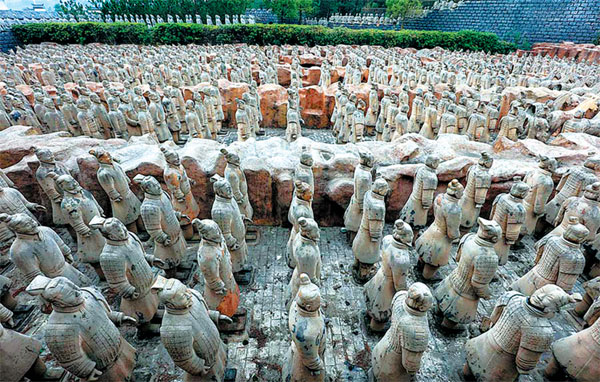Fake Terracotta Warriors exhibit site sparks legal dispute
The Museum of Qin Terracotta Warriors and Horses in Xi'an, capital of Shaanxi province, is home to the world-renowned Terracotta Warriors of the Qin Dynasty (221-206 BC). However, some 1,000 kilometers away, full-scale replicas of these awe-inspiring figures are on display at 5,000-Year Culture Expo Park in Anqing, Jiangsu province.
The unauthorized exhibition has sparked headlines in the Chinese media and triggered a debate about whether the display constitutes an intellectual property infringement.
The replica group of more than 1,000 terracotta figurines made by a Xi'an company is located at a scenic site called 1,000-Year Dream within the expo park in Taihu county, and covers some 667 square meters, Yin Zhaoping, CEO of the park, was quoted as saying on the China National Radio website.
The site also includes other attractions such as replicas of the Great Wall and Mount Huaguo, or Flowers and Fruit Mountain, home of the legendary Monkey King in the classic novel Journey to the West. Visitors outside of Taihu county can visit the park for 120 yuan ($17), while those from the county can enter free of charge.
"We have no intention of infringing any intellectual property rights," the Xi'an-based Chinese Business View newspaper quoted Yin as saying.
A sculpture of Qinshihuang, the first emperor of a united China in the Qin Dynasty, standing on the replica of the Great Wall, distinguishes the Anqing exhibition from the real one in Xi'an.

Unlike many other operators in Xi'an who cheated tourists by claiming that their fake Terracotta Warriors were real, Yin said "we have never claimed that our place is Pit No 1" of the Emperor Qinshihuang's Mausoleum Site Museum.
"Everyone knows that the real Terracotta Warriors are in Xi'an. What we do is to present the ancient emperor's resolution to unite the country."
Wei Guo, an IP attorney in Anhui, said in his written legal opinions offered to the park that he doubted if the museum has the right to use cultural heritage as a means through which to apply for trademarks, and thus subsequently close the park's exhibition.
Yet Liu Zhihan, an associate researcher of an IP research center at the China University of Political Science and Law, told the Chinese Business View that the expo park has profited from the display of counterfeit terracotta figurines, which has affected the museum's business and violated the Unfair Competition Law.
The museum claims in a public statement on its official website that it possesses all legal rights to the names "Emperor Qinshihuang's Mausoleum Site Museum" and "Museum of Qinshihuang's Terracotta Army", and has the exclusive right to use all related registered trademarks.
The statement cited the Anqing site as one example of an unauthorized exhibition and said the museum reserves the right to take legal action over the issue.
Hou Ningbin, head of the museum, told CNR that "we had no prior knowledge of, nor gave consent to, the Anqing exhibition".
"Our attorney will send a lawyer's letter to the park's operators to inform them of the violation. We will then look to enter discussions with them to resolve the issue."
|
Replicas of Terracotta Warriors are displayed at 5,000-Year Culture Expo Park in Jiangsu province. Provided to China Daily |
(China Daily 03/02/2017 page17)















